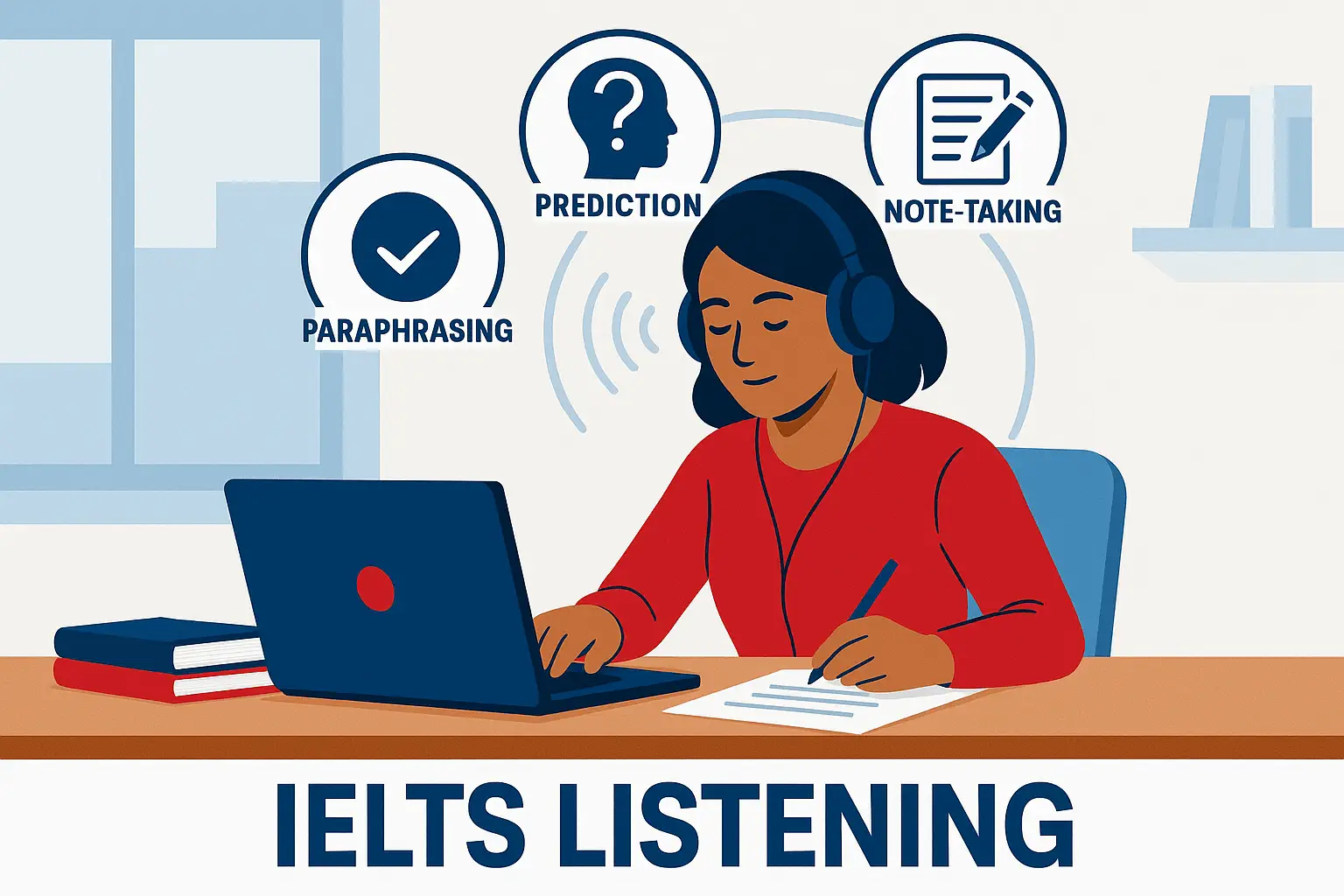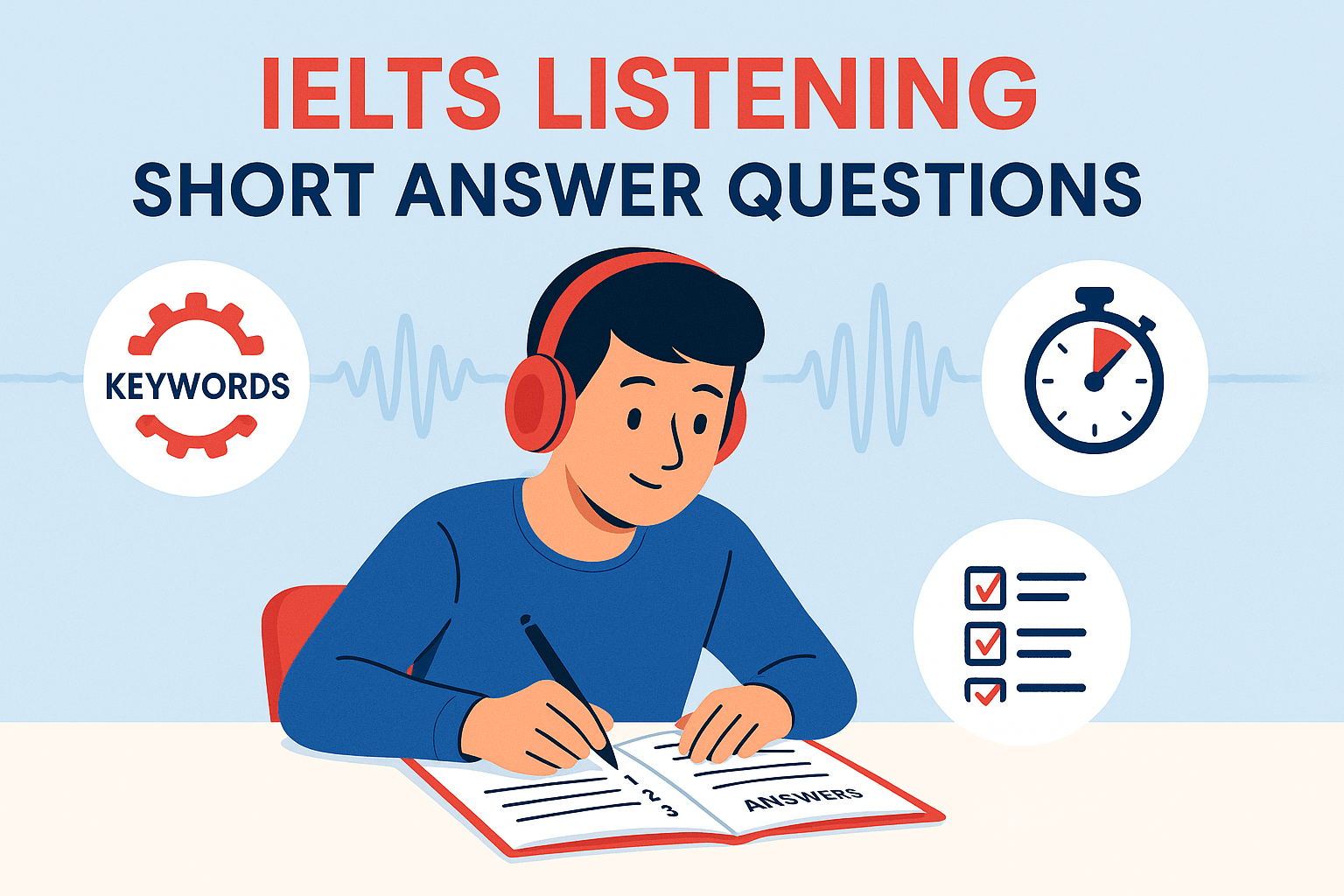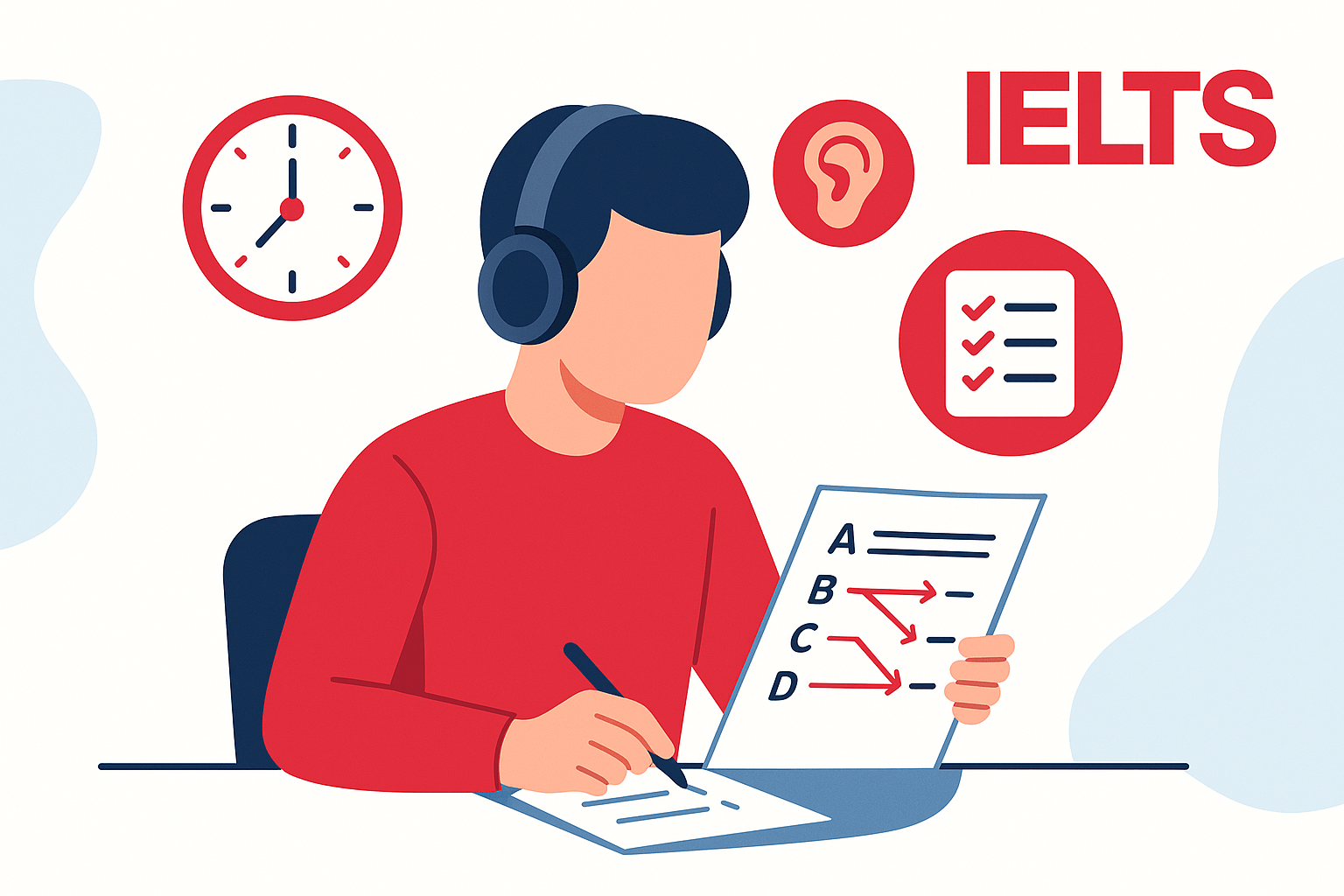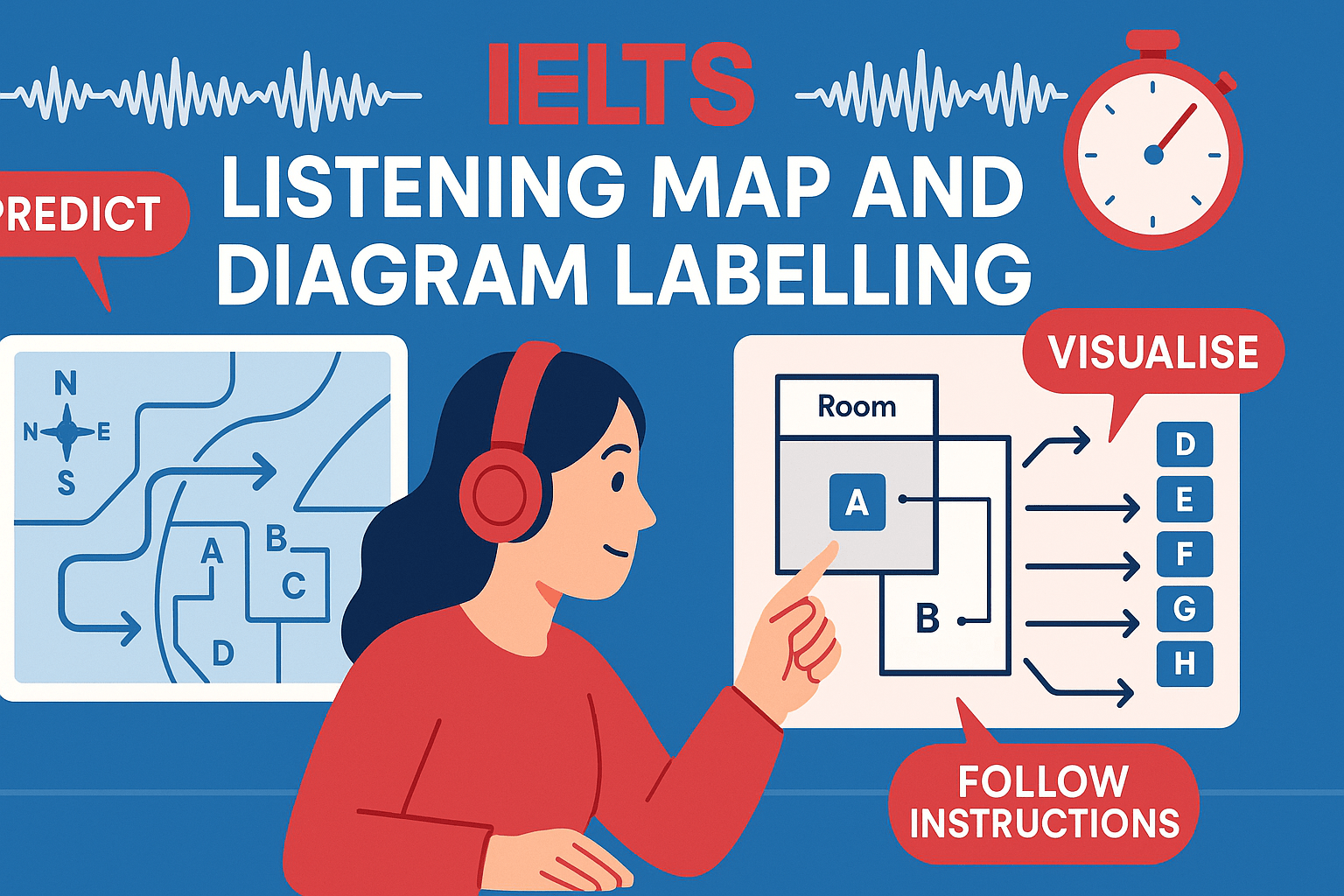- Understanding the IELTS Listening Test Format
- Core Listening Skills You Need to Succeed
- Common IELTS Listening Question Types
- Band Score Descriptors & Common Mistakes
- Vocabulary for IELTS Listening: Boost Comprehension
- Practice Routine: What I Recommend for Band 7–9
- Real Student Challenges — And How We Solved Them
- FAQ: IELTS Listening
- Final Thoughts: You Can Master IELTS Listening
As an international IELTS teacher who’s helped learners across five continents, I can tell you this: mastering the IELTS Listening test is absolutely achievable — even if English isn’t your strong suit. I’ve worked with countless students who struggled at first but eventually hit Band 8 or even 9 by focusing on the right skills, daily practice, and smart strategies.
In this complete guide to IELTS Listening, I’ll walk you through the essentials: test format, question types, key listening skills, band score tips, and how to build an effective practice routine. Along the way, I’ll also point you to detailed guides on each subtopic so you can dive deeper where needed.
Understanding the IELTS Listening Test Format
Let’s start with what to expect. Many students I’ve taught assumed the Listening test was “just listening and writing,” but there’s much more beneath the surface. The test includes four sections, each increasing in difficulty, with different speakers, accents, and contexts — from casual dialogues to academic monologues.
Knowing the format reduces anxiety and helps you predict what’s coming next. If you’re not already familiar with the structure, I break it down clearly in this IELTS Listening Test Format Overview.
Core Listening Skills You Need to Succeed
To aim for Band 7–9, you need more than just good ears. The top performers develop and combine prediction, paraphrasing, and note-taking skills.
One of my students, a pharmacist from Vietnam, improved from Band 6.5 to 8 by learning how to predict key words before audio began. This is especially helpful in forms and tables, where missing one detail can cost a mark.
Another student in Italy struggled with synonyms — until I showed her how paraphrasing works in Listening. She followed this IELTS Listening Strategies & Skills guide and within three weeks, her accuracy jumped dramatically.
If you’re unfamiliar with these techniques, that guide is where to start.
Common IELTS Listening Question Types
Not all questions are created equal — and not all students struggle with the same types. I’ve seen some learners breeze through multiple choice but panic at matching headings or maps.
Each question type requires its own approach. That’s why I recommend studying the techniques for sentence completion, form/table/note completion, map labelling, matching, and MCQs individually.
You’ll find examples, formats, and how to avoid traps in this IELTS Listening Question Types Guide. It’s helped many of my students decode tricky sections and build confidence across all four parts of the test.
Band Score Descriptors & Common Mistakes
What’s the difference between Band 6.5 and 8.0? I’ve sat with learners reviewing their mock tests, and often it comes down to avoidable errors — mishearing a number, not checking plurals, or spelling mistakes.
The IELTS Listening scoring system is straightforward — 30 correct answers = Band 7, 35 = Band 8. But the consistency of your accuracy matters most. If you’re frequently losing marks in Section 3 or 4, it likely means you’re missing advanced cues like tone, inference, or academic transitions.
I go over the most common student mistakes — and how to fix them — in this IELTS Listening Band Descriptors & Common Errors guide. One of my learners in Turkey used it to correct her spelling and number-listening weaknesses and gained a full band score.
Vocabulary for IELTS Listening: Boost Comprehension
You don’t need to memorize the dictionary to score well, but targeted vocabulary practice can make a massive difference. Focus on topics like education, work, environment, and health — these come up frequently in IELTS audio.
Many of my students struggle not because they misheard something, but because they didn’t understand what they heard. If vocabulary is your struggle, this IELTS Listening Vocabulary Practice Guide has helped many of my students bridge that gap.
It includes real IELTS-style vocabulary in context, with listening-focused exercises for better retention.
Practice Routine: What I Recommend for Band 7–9
Let me share what’s worked for my most successful students: consistency + reflection.
Here’s a simple weekly breakdown I give:
- 3–4 full listening tests per week (under exam conditions)
- Daily short practice sessions (10–15 mins) using BBC podcasts or TED talks
- Weekly review of incorrect answers — identify patterns in your mistakes
- Targeted skill-building (e.g. paraphrasing, note-taking, map labelling)
Also, don’t underestimate the value of high-quality IELTS practice tests. Use official resources from IELTS.org, British Council, and IDP for authentic material.
And if you’re looking for a structured course with tutor feedback, check out my recommended IELTS premium courses.
Real Student Challenges — And How We Solved Them
- Nadia (Egypt) was stuck at Band 6.5 due to poor note-taking. We practised shorthand and visual triggers. Her Band 8.0 came within 6 weeks.
- Ahmed (Bangladesh) panicked during multiple-choice sections. I introduced keyword prediction and elimination strategy from this guide. Problem solved.
- Tomoko (Japan) misheard numbers and dates. We focused on spelling drills and recorded number dictations. She scored 7.5 after three failed attempts.
The lesson? Every struggle has a solution — you just need to find the right strategy and stick to it.
FAQ: IELTS Listening
How many times can I listen to the audio?
Just once. This is why prediction and staying focused are critical throughout.
What accents appear in the IELTS Listening test?
You’ll hear British, Australian, Canadian, and occasionally American or New Zealand accents. Practice with a variety of sources.
Is spelling important in IELTS Listening?
Yes. A misspelled word is marked incorrect — even if you heard it right.
Can I write answers in capital letters?
Absolutely. Many students use all caps to avoid confusion in handwriting.
Is it harder for non-native speakers to get Band 8+?
Not necessarily. I’ve taught students from over 20 countries who reached Band 8–9 with consistent effort and skill-focused preparation.
Final Thoughts: You Can Master IELTS Listening
If you’ve ever felt overwhelmed by the IELTS Listening section, you’re not alone — but you’re not stuck either.
By understanding the test format, mastering core skills, and practising intentionally, you can absolutely aim for Band 7–9. I’ve watched students with low confidence transform into high scorers using the exact strategies I’ve shared in this guide.
Ready to get serious about Listening? Start here, revisit the linked guides when needed, and never stop improving.
Good luck — and I’m here to help when you need it.






17 Responses
you’re really a just right webmaster. The website loading pace is incredible. It sort of feels that you’re doing any unique trick. Furthermore, The contents are masterwork. you have performed a excellent activity on this subject!
Some really nice stuff on this website , I love it.